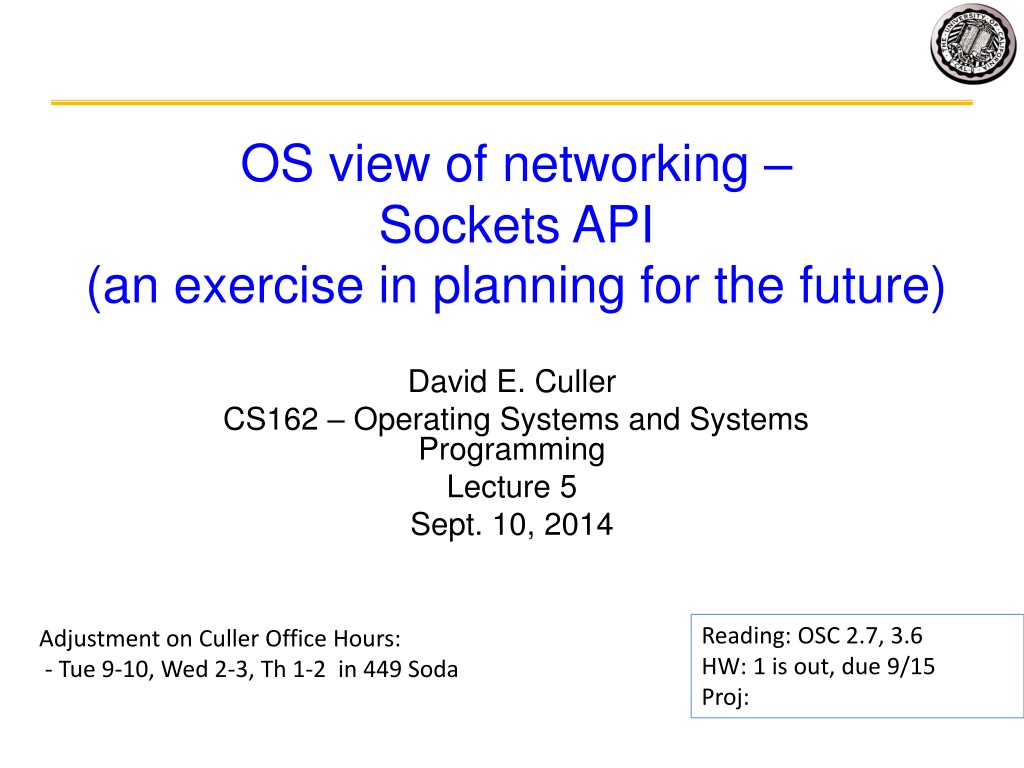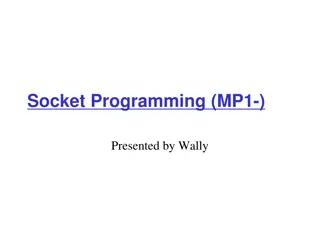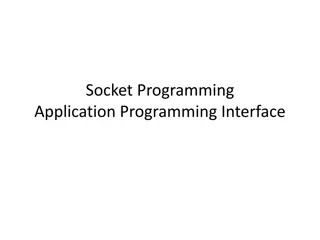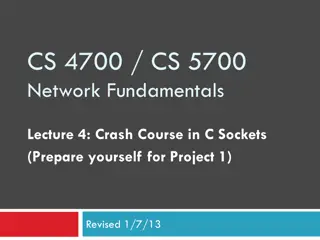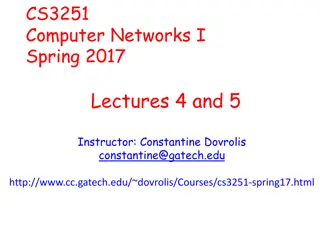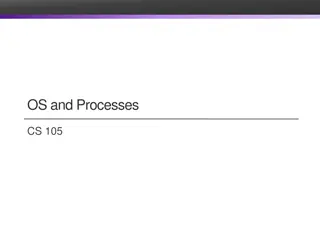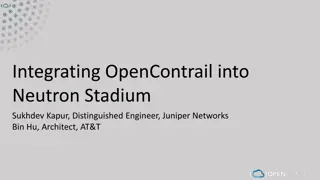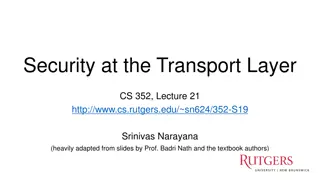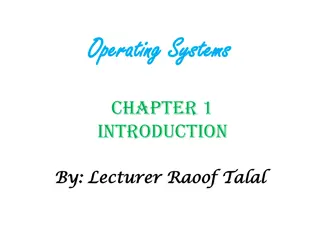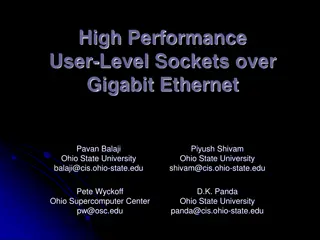Understanding Networking Sockets API in Operating Systems
Delve into networking sockets API for inter-process communication and data transfer, exploring client-server models, request-response protocols, and communication paradigms across different networks. Learn about the mechanisms in OS for networking, examining practical examples, codes, and readings to enhance your understanding in systems programming.
Download Presentation

Please find below an Image/Link to download the presentation.
The content on the website is provided AS IS for your information and personal use only. It may not be sold, licensed, or shared on other websites without obtaining consent from the author. Download presentation by click this link. If you encounter any issues during the download, it is possible that the publisher has removed the file from their server.
E N D
Presentation Transcript
OS view of networking Sockets API (an exercise in planning for the future) David E. Culler CS162 Operating Systems and Systems Programming Lecture 5 Sept. 10, 2014 Reading: OSC 2.7, 3.6 HW: 1 is out, due 9/15 Proj: Adjustment on Culler Office Hours: - Tue 9-10, Wed 2-3, Th 1-2 in 449 Soda
Real Reading Unix Network Programming. The Sockets Networking API, Stevens (et al), Ch 3-5 Elementary Sockets Lots of on-line tutorials This lecture and the code http://cs162.eecs.berkeley.edu/static/lectures/code05/eclient.c http://cs162.eecs.berkeley.edu/static/lectures/code05/eserver.c http://cs162.eecs.berkeley.edu/static/lectures/code05/feserver.c 9/10/14 cs162 fa14 L5 2
Communication between processes write(wfd, wbuf, wlen); n = read(rfd,rbuf,rmax); Producer and Consumer of a file may be distinct processes May be separated in time (or not) 9/10/14 cs162 fa14 L5 3
Communication Across the world looks like file IO write(wfd, wbuf, wlen); n = read(rfd,rbuf,rmax); But what s the analog of open? What is the namespace? How are they connected in time? 9/10/14 cs162 fa14 L5 4
Request Response Protocol Client (issues requests) Server (performs operations) write(rqfd, rqbuf, buflen); requests n = read(rfd,rbuf,rmax); wait service request write(wfd, respbuf, len); responses n = read(resfd,resbuf,resmax); 9/10/14 cs162 fa14 L5 5
Request Response Protocol Client (issues requests) Server (performs operations) write(rqfd, rqbuf, buflen); requests n = read(rfd,rbuf,rmax); wait service request write(wfd, respbuf, len); responses n = read(resfd,resbuf,resmax); 9/10/14 cs162 fa14 L5 6
Client-Server Models Client 1 Client 2 Server *** Client n File servers, web, FTP, Databases, Many clients accessing a common server 9/10/14 cs162 fa14 L5 7
Sockets Mechanism for inter-process communication Data transfer like files Read / Write against a descriptor Over ANY kind of network Local to a machine Over the internet (TCP/IP, UDP/IP) OSI, Appletalk, SNA, IPX, SIP, NS, 9/10/14 cs162 fa14 L5 8
Silly Echo Server running example Client (issues requests) Server (performs operations) gets(fd,sndbuf, ); requests write(fd, buf,len); n = read(fd,buf,); wait print write(fd, buf,); responses n = read(fd,rcvbuf, ); print 9/10/14 cs162 fa14 L5 9
Echo client-server example void client(int sockfd) { int n; char sndbuf[MAXIN]; char rcvbuf[MAXOUT]; getreq(sndbuf, MAXIN); /* prompt */ while (strlen(sndbuf) > 0) { write(sockfd, sndbuf, strlen(sndbuf)); /* send */ memset(rcvbuf,0,MAXOUT); n=read(sockfd, rcvbuf, MAXOUT-1); */ write(STDOUT_FILENO, rcvbuf, n); getreq(sndbuf, MAXIN); } } void server(int consockfd) { char reqbuf[MAXREQ]; int n; while (1) { memset(reqbuf,0, MAXREQ); n = read(consockfd,reqbuf,MAXREQ-1); /* Recv */ if (n <= 0) return; n = write(STDOUT_FILENO, reqbuf, strlen(reqbuf)); n = write(consockfd, reqbuf, strlen(reqbuf)); /* echo*/ } } /* clear */ /* receive /* echo */ /* prompt */ 9/10/14 cs162 fa14 L5 10
Prompt for input char *getreq(char *inbuf, int len) { /* Get request char stream */ printf("REQ: "); /* prompt */ memset(inbuf,0,len); /* clear for good measure */ return fgets(inbuf,len,stdin); /* read up to a EOL */ } 9/10/14 cs162 fa14 L5 11
Socket creation and connection File systems provide a collection of permanent objects in structured name space Processes open, read/write/close them Files exist independent of the processes Sockets provide a means for processes to communicate (transfer data) to other processes. Creation and connection is more complex Form 2-way pipes between processes Possibly worlds away 9/10/14 cs162 fa14 L5 12
Sockets in concept Client Server Create Server Socket Create Client Socket Bind it to an Address (host:port) Listen for Connection Connect it to server (host:port) Accept connection Connection Socket write request read request read response write response Close Client Socket Close Connection Socket Close Server Socket 9/10/14 cs162 fa14 L5 13
Client Protocol char *hostname; int sockfd, portno; struct sockaddr_in serv_addr; struct hostent *server; server = buildServerAddr(&serv_addr, hostname, portno); /* Create a TCP socket */ sockfd = socket(AF_INET, SOCK_STREAM, 0) /* Connect to server on port */ connect(sockfd, (struct sockaddr *) &serv_addr, sizeof(serv_addr) printf("Connected to %s:%d\n",server->h_name, portno); /* Carry out Client-Server protocol */ client(sockfd); /* Clean up on termination */ close(sockfd); 9/10/14 cs162 fa14 L5 14
Server Protocol (v1) /* Create Socket to receive requests*/ lstnsockfd = socket(AF_INET, SOCK_STREAM, 0); /* Bind socket to port */ bind(lstnsockfd, (struct sockaddr *)&serv_addr,sizeof(serv_addr)); while (1) { /* Listen for incoming connections */ listen(lstnsockfd, MAXQUEUE); /* Accept incoming connection, obtaining a new socket for it */ consockfd = accept(lstnsockfd, (struct sockaddr *) &cli_addr, &clilen); server(consockfd); close(consockfd); } close(lstnsockfd); 9/10/14 cs162 fa14 L5 15
Administrative break 9/10/14 cs162 fa14 L5 16
How does the server protect itself? Isolate the handling of each connection By forking it off as another process 9/10/14 cs162 fa14 L5 17
Sockets in concept Client Server Create Server Socket Create Client Socket Bind it to an Address (host:port) Listen for Connection Connect it to server (host:port) Accept connection child Connection Socket Parent Close Listen Socket Close Connection Socket write request read request read response write response Close Connection Socket Wait for child Close Client Socket Close Server Socket 9/10/14 cs162 fa14 L5 18
Server Protocol (v2) while (1) { listen(lstnsockfd, MAXQUEUE); consockfd = accept(lstnsockfd, (struct sockaddr *) &cli_addr, &clilen); cpid = fork(); /* new process for connection */ if (cpid > 0) { /* parent process */ close(consockfd); tcpid = wait(&cstatus); } else if (cpid == 0) { /* child process */ close(lstnsockfd); /* let go of listen socket */ server(consockfd); close(consockfd); exit(EXIT_SUCCESS); /* exit child normally */ } } close(lstnsockfd); 9/10/14 cs162 fa14 L5 19
Concurrent Server Listen will queue requests Buffering present elsewhere But server waits for each connection to terminate before initiating the next 9/10/14 cs162 fa14 L5 20
Sockets in concept Client Server Create Server Socket Create Client Socket Bind it to an Address (host:port) Listen for Connection Connect it to server (host:port) Accept connection child Connection Socket Parent Close Listen Socket Close Connection Socket write request read request read response write response Close Connection Socket Close Client Socket Close Server Socket 9/10/14 cs162 fa14 L5 21
Server Protocol (v3) while (1) { listen(lstnsockfd, MAXQUEUE); consockfd = accept(lstnsockfd, (struct sockaddr *) &cli_addr, &clilen); cpid = fork(); /* new process for connection */ if (cpid > 0) { /* parent process */ close(consockfd); //tcpid = wait(&cstatus); } else if (cpid == 0) { /* child process */ close(lstnsockfd); /* let go of listen socket */ server(consockfd); close(consockfd); exit(EXIT_SUCCESS); /* exit child normally */ } } close(lstnsockfd); 9/10/14 cs162 fa14 L5 22
Server Address - itself memset((char *) &serv_addr,0, sizeof(serv_addr)); serv_addr.sin_family = AF_INET; serv_addr.sin_addr.s_addr = INADDR_ANY; serv_addr.sin_port = htons(portno); Simple form Internet Protocol accepting any connections on the specified port In network byte ordering 9/10/14 cs162 fa14 L5 23
Client: getting the server address struct hostent *buildServerAddr(struct sockaddr_in *serv_addr, char *hostname, int portno) { struct hostent *server; /* Get host entry associated with a hostname or IP address */ server = gethostbyname(hostname); if (server == NULL) { fprintf(stderr,"ERROR, no such host\n"); exit(1); } /* Construct an address for remote server */ memset((char *) serv_addr, 0, sizeof(struct sockaddr_in)); serv_addr->sin_family = AF_INET; bcopy((char *)server->h_addr, (char *)&(serv_addr->sin_addr.s_addr), server->h_length); serv_addr->sin_port = htons(portno); return server; } 9/10/14 cs162 fa14 L5 24
Namespaces for communication Hostname www.eecs.berkeley.edu IP address 128.32.244.172 (ipv6?) Port Number 0-1023 are well known or system ports Superuser privileges to bind to one 1024 49151 are registered ports (registry) Assigned by IANA for specific services 49152 65535 (215+214 to 216 1) are dynamic or private Automatically allocated as ephemeral Ports 9/10/14 cs162 fa14 L5 25
Recall: UNIX Process Management UNIX fork system call to create a copy of the current process, and start it running No arguments! UNIX exec system call to change the program being run by the current process UNIX wait system call to wait for a process to finish UNIX signal system call to send a notification to another process 9/10/14 cs162 fa14 L5 26
Signals infloop.c #include <stdlib.h> #include <stdio.h> #include <sys/types.h> #include <unistd.h> #include <signal.h> void signal_callback_handler(int signum) { printf("Caught signal %d - phew!\n",signum); exit(1); } int main() { signal(SIGINT, signal_callback_handler); while (1) {} } 9/10/14 cs162 fa14 L5 27
Process races: fork.c if (cpid > 0) { mypid = getpid(); printf("[%d] parent of [%d]\n", mypid, cpid); for (i=0; i<100; i++) { printf("[%d] parent: %d\n", mypid, i); // sleep(1); } } else if (cpid == 0) { mypid = getpid(); printf("[%d] child\n", mypid); for (i=0; i>-100; i--) { printf("[%d] child: %d\n", mypid, i); // sleep(1); } } 9/10/14 cs162 fa14 L5 28
BIG OS Concepts so far Processes Address Space Protection Dual Mode Interrupt handlers (including syscall and trap) File System Integrates processes, users, cwd, protection Key Layers: OS Lib, Syscall, Subsystem, Driver User handler on OS descriptors Process control fork, wait, signal --- exec Communication through sockets Client-Server Protocol 9/10/14 cs162 fa14 L5 29
Course Structure: Spiral File Systems (8) AddressSpace(4) Distributed Systems(8) OSConcepts(3) intro Reliability, Security, Cloud (8) Concurrency(6) 9/10/14 cs162 fa14 L5 30
